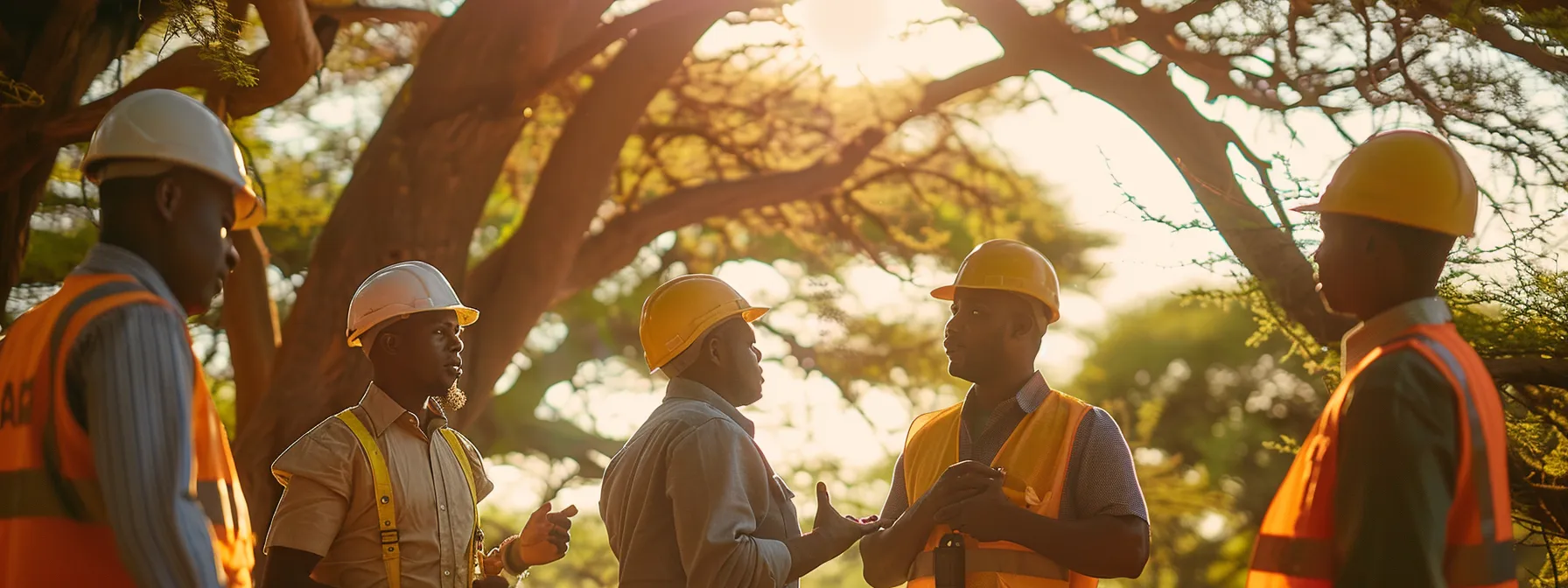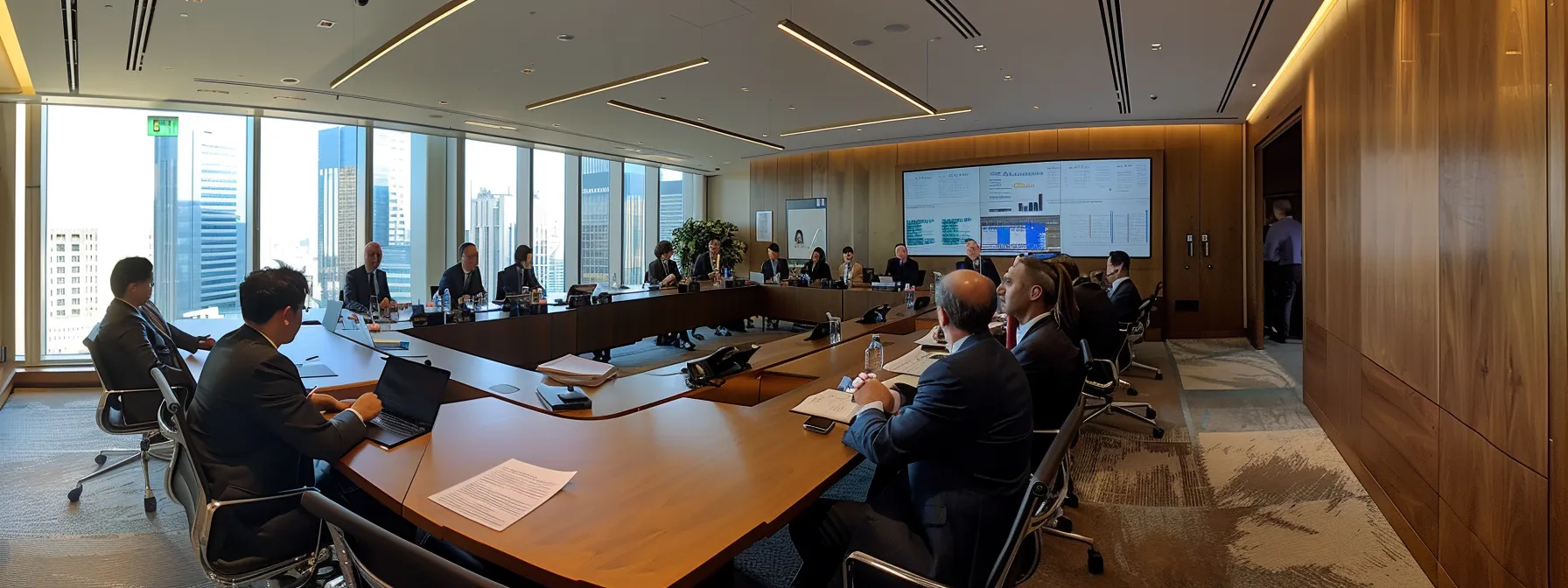In the intricate world of construction, navigating FIDIC contracts and the International Chamber of Commerce (ICC) arbitration process can be perplexing. Yet, mastering these is non-negotiable to safeguard your trade and project outcomes. This article delves into the essential elements of FIDIC contracts, their varying types, and the strategic clauses that can impact your projects. Also, it untangles the step-by-step ICC arbitration procedure—a key method for resolving contract disputes. By absorbing the knowledge here, you’ll not only avert common implementation issues but also gain the confidence to handle disputes with finesse. Your proficiency in these areas is about to fortify, paving the way for robust contract management and dispute resolution in your international construction ventures.
Key Takeaways
- Mastering FIDIC contracts is essential for effective international construction project management
- ICC Arbitration offers a structured, efficient alternative to traditional litigation for resolving disputes
- Staying updated on FIDIC revisions ensures compliance and adaptability to legal and environmental changes
- Investing in legal expertise and education enhances the management of contract complexities
- Clear communication with stakeholders is crucial to prevent conflicts and streamline project execution
Understanding the Fundamentals of FIDIC Contracts

As you delve into the complexities of construction contracts, it’s vital to grasp the fundamentals of FIDIC agreements. Originating as a definitive framework for industry standards, FIDIC contracts serve as a blueprint governing international construction projects. Key features of these standardized forms streamline the legal framework, thus harmonizing project-related expectations and obligations. Emphasizing the use of alternative dispute resolution over costly litigation, FIDIC’s established role facilitates efficiency and predictability in a terrain often marked by conflict. This introduction paves the way for an in-depth examination of the history, structure, and strategic application of FIDIC contracts in managing your construction project ventures effectively.
The Origin and Purpose of FIDIC Contracts
When you embark on a construction project, understanding the historical context and purpose of FIDIC contracts is crucial. These agreements originated from the International Federation of Consulting Engineers (FIDIC), established in 1913, with the aim to provide a standardized framework for the global construction industry. Renowned for advocating professional excellence, FIDIC’s contracts serve to delineate clear roles and responsibilities, including those of the engineer, which can be pivotal in avoiding disputes and ensuring project delivery meets the highest standards.
Specifically crafted to support you in mitigating risks, FIDIC contracts encompass mechanisms for dispute resolution. The use of an arbitral tribunal, often under the auspices of the International Chamber of Commerce, ensures a structured and efficient approach to addressing conflicts that may arise during construction projects. This strategic emphasis on arbitration over prolonged litigation highlights FIDIC’s commitment to furnish the construction sector with reliable, serviceable legal instruments, reducing the likelihood of project impediments related to legal strife or crime.
Key Features of FIDIC Standard Forms
As a lawyer well-versed in FIDIC contracts, you recognize the central role they play in structuring international infrastructure projects. A primary feature includes clearly defined terms that allocate risks and responsibilities, ensuring that all parties are on the same page from the outset. This clarity safeguards against misunderstandings that could possibly lead to disputes or even the need to execute an arbitration award.
Another essential characteristic is the detailed procedure to manage variations and claims, providing you with a robust framework to present evidence and arguments. Implementing such procedures effectively enables you to navigate changes in project scope while protecting your interests – a necessity in the dynamic field of construction. Following these guidelines not only facilitates a smoother project flow but also substantially reduces the risk of costly and time-consuming litigation:
- Clear allocation of risk and responsibilities
- Structured procedures for variations and claims
- Efficient dispute resolution mechanisms
The Role of FIDIC in International Construction
In the realm of international construction, FIDIC contracts act as a key facilitator of uniform standards and practices. With provisions such as the arbitration clause, these agreements significantly minimize the complexities of transborder jurisdiction issues. You’ll find that stricter control and predictability of processes under FIDIC contracts reduces the need for a conventional trial, simplifying dispute resolution and allowing construction projects to move forward with less friction.
Efficient handling of potential disputes through ICC Arbitration under FIDIC contracts curtails the exhaustive process of discovery, often a concern in multiple-jurisdiction scenarios. By adopting these provisions, you avoid the delays and costs typically associated with extensive litigation, as the set standards offer a more streamlined and effective path to resolving disagreements, ensuring that the delicate balance of timing and budgets in construction projects is upheld.
Exploring the Different Types of FIDIC Contracts

As you navigate the terrain of construction contracts, understanding the nuances of FIDIC’s various contract types is critical for effective management and dispute settlement. This section introduces you to the Red Book, which provides guidelines for building and engineering works as designed by you, the Employer, and the Yellow Book, tailored for plant and design-build projects. We will also explore the Silver Book for EPC/Turnkey Projects and the Green Book, a short form of contract for smaller scope ventures. Each form offers unique features, from sustainability considerations to streamlined judge and appeal processes, ensuring you can select the most suitable contract for your project’s needs.
Red Book: Building and Engineering Works Designed by the Employer
Within the domain of FIDIC contracts, the Red Book emerges as your go-to guide for construction and engineering projects where you, the employer, are responsible for the design. Its structured clauses provide a robust framework for risk allocation, directly impacting project execution and financial control. The Red Book’s comprehensive approach to dispute resolution is aligned with the Federal Arbitration Act and international treaty principles, promoting fair commerce and mitigating the chances of a protracted legal contest.
In your application of the Red Book, it is vital to consider its emphasis on dispute resolution through ICC Arbitration, which serves as a secure and controlled environment for resolving potential conflicts. This process leverages a pre-agreed mechanism under the commerce-related aspects of construction, bypassing common judicial hurdles and reflecting a commitment to efficient treaty-based settlement strategies. As a result, your grasp of the Red Book’s arbitration procedures ensures that risk management and resolution tactics become an integral part of your project from inception to completion.
Yellow Book: Plant and Design-Build Projects
The FIDIC Yellow Book addresses the intricacies of plant and design-build projects that require the integrated efforts of you, the civil engineer, and the contractor. You must navigate contractual clauses that focus on incoterms and the allocation of design responsibilities to ensure a seamless project trajectory. Recognizing the specified duties within the Yellow Book empowers you to drive the project forward effectively while controlling risks associated with procurement and project execution.
Effective dispute resolution is underscored by the inclusion of mediation before resorting to arbitration within the Yellow Book’s framework. As a crucial step, this mediation process provides you with an opportunity to resolve conflicts without the need for a formal witness or an extensive fee structure. Streamlining the resolution process is not only cost-effective but also maintains the project timeline, ensuring delivery milestones are met:
- Mitigate risks with clear incoterms
- Control project execution with design-build specific clauses
- Save time and resources through structured mediation
Silver Book: EPC/Turnkey Projects
The Silver Book, addressing Engineering, Procurement, and Construction (EPC) or Turnkey Projects, stands out within the FIDIC suite as a preferred contract for situations where time and cost certainty are paramount. Attributing considerable responsibilities to the contractor for design and execution, it demands a high level of performance, underpinned by the imperative to adhere strictly to judicial processes, including adherence to the Convention on the Recognition and Enforcement of Foreign Arbitral Awards. This particular FIDIC form equips you with a judicially respected framework, significantly diminishing the duration and complexity typically associated with achieving fair judgment and enforcement in international construction disputes.
Aligning closely with the detailed standards set by the Financial Industry Regulatory Authority (FINRA), the Silver Book’s robust arbitration clauses serve to protect your interests in the event of employment-related challenges or other disputes. By outlining an agreed-upon process for dispute resolution through ICC Arbitration, the Silver Book minimizes reliance on unpredictable judiciary decisions and circumvents protracted litigation, facilitating a controlled and predictable project environment for all stakeholders:
- Minimize uncertainty with strong arbitration clauses
- Enhance project predictability by reducing judiciary intervention
- Protect financial and employment interests with standardized dispute resolution
Green Book: Short Form of Contract
The Green Book, endorsed by the World Customs Organization for its simplicity and expediency, serves as the FIDIC standard form of contract for shorter, more straightforward construction projects. Its condensed nature makes it ideal for contracts of lower value, reducing complexity and aligning with the principles of the United Nations Commission on International Trade Law (UNCITRAL) for efficient resolution of disputes. This facilitates an accessible framework for you to manage construction projects with less legal overhead, streamlining progress within the United Kingdom and beyond.
Aligned with organization and clarity, the Green Book helps you to function as both plaintiff and executor, fostering clear communication and robust contract administration. It provides a firm basis for straightforward dispute resolution without entanglement in lengthy legal procedures, consistent with the spirit of the well-established ICC Arbitration principles. This offers you peace of mind as you oversee construction projects, ensuring that you possess an efficient tool for legal recourse that upholds international standards of trade and construction law.
Critical Clauses in FIDIC Contracts and Their Implications

Mastering the essential clauses in FIDIC contracts empowers you to navigate procurement smoothly, ensure punctual payment, and assert legal standing in small claims court or under the scrutiny of entities such as the United States Congress or the World Intellectual Property Organization. You’ll dive into the risk allocation provisions, variation and change management, delay damages and extension of time, and dissect payment terms and mechanisms. Each aspect is pivotal to maintaining control over your construction project’s timeline, costs, and legal obligations.
Risk Allocation Provisions
Risk allocation is a cornerstone of FIDIC contracts, particularly when it comes to turnkey projects where you have more at stake. The language within these contracts offers a balanced distribution of risks, ensuring that you aren’t left vulnerable to unforeseen events. For instance, if a project is located in Paris, local construction norms and the risk of regulatory changes could impact timelines and costs. By carefully negotiating FIDIC terms, you preemptively manage these risks, aligning them with your capacity to absorb and mitigate potential setbacks.
Understanding how risk allocation clauses function under different legislative environments, such as the legal framework of the Supreme Court of the United States, is fundamental. These clauses are not just boilerplate; they require meticulous tailoring during the negotiation phase to reflect the specifics of your project. This proactive approach to negotiating your FIDIC contract streamlines processes and reduces the need for ICC Arbitration, facilitating a more predictable and controlled project flow:
Variation and Change Management
Effective variation and change management within FIDIC contracts are key to maintaining your project’s economy. As you might handle a project with investments at its core, especially in regions renowned for financial stability like Switzerland, you need to ensure that any change in scope, design, or timeline is addressed with precision and clear contractual backing. Accurate documentation of these changes is critical for enforcing terms later, should the matter escalate to entities like the International Centre for Settlement of Investment Disputes.
In navigating modification requests or unforeseen conditions on your construction site, the clauses stipulating variation and change management come to the forefront. A clear process here keeps the project aligned with your overall investment goals and helps avoid costly delays. Should an impasse still occur, relying on professional dispute resolution services such as JAMS, in conjunction with ICC Arbitration rules established in the contract, facilitates fair and efficient resolution, keeping the project on track and safeguarding your financial interests.
Delay Damages and Extension of Time
As the employer overseeing a building project, it’s imperative for you to understand FIDIC contracts’ stipulations on delay damages and extension of time. These clauses are crucial to the integrity of contract management, serving as safeguards that stipulate fair compensation for delays, while providing mechanisms for justifiable extensions when unforeseen events affect project timelines. In the realm of general construction, precise adherence to these terms can determine the financial viability of your venture.
Considering the contractual intricacies, it’s worth noting that managing these provisions effectively will enhance your project’s financial stability. A structured approach to documenting and submitting claims for the extension of time under FIDIC terms ensures that your building project adheres to set budgets and timeframes, minimizing disputes and the need for ICC Arbitration:
- Ensure accurate record-keeping for extension of time requests
- Adopt proactive contract management practices to handle potential delays
Payment Terms and Mechanisms
Understanding payment terms and mechanisms is a critical aspect of mastering FIDIC contracts to ensure timely and fair economic exchanges in international trade. The FIDIC clauses guide you on how to structure payment schedules that align with the pace of work and safeguard against unforeseen expenses. These provisions are designed to enable both employers and contractors to manage cash flow effectively while ensuring that insurance and other financial guarantees are in place to secure payment obligations.
To avoid disputes that may require ICC Arbitration, you should give meticulous attention to payment clauses within the contract. Detailed records of progress and expenses help meet the expectations set forth by the contract and facilitate approvals during general assembly reviews, making sure that payments are released according to the agreed plan. Consider the following steps to ensure effective payment management:
- Establish clear payment milestones linked to project phases.
- Implement rigorous documentation to validate progress and expense claims.
- Ensure insurance policies are in place to protect against default.
Common Challenges in Implementing FIDIC Contracts

As you navigate the intricacies of trade finance and construction projects, implementing FIDIC contracts presents its unique challenges. Navigating complex contractual obligations, reconciling cultural and legal differences across borders, and resolving ambiguities in contract terms are critical areas for focus. International financial institutions often require robust documentation to support motions related to the Yellow Book’s stipulations, making a deep understanding of these elements essential. The forthcoming sections will provide you with valuable insights aimed at mastering these challenges, ensuring your projects progress with financial and legal precision.
Navigating Complex Contractual Obligations
Navigating complex contractual obligations with FIDIC contracts requires a commitment to good faith and a robust understanding of the framework’s norms. Dealing with issues such as calculating damages or adhering to project schedules demands your careful consideration to preserve community interests within the construction sector. Integrating the standards set by institutions like the American Arbitration Association can enhance the contract’s enforceability, ensuring a smoother path to dispute resolution when needed.
Understanding how to apply FIDIC provisions can steer your project away from common pitfalls. For example, your initiation into the FIDIC program should include strategies for documenting and evidencing compliance with complex contractual obligations. This approach not only serves as a shield against claims for damages but also reinforces your reputation as a conscientious partner in the international construction community:
Cultural and Legal Differences in International Projects
As your attorney, it’s my role to ensure that when you undertake international construction projects, you’re equipped to manage the cultural and legal differences that invariably arise. Specifically, nuances in design specification might require local knowledge to guarantee compliance with regional standards and obtain the necessary consents. An understanding of France’s unique construction laws and business etiquette, for example, is essential to smooth collaborations and dispute resolution.
Effective communication and cultural sensitivity are key when you’re adapting FIDIC contracts for use in diverse legal landscapes. Be particularly attentive to how specifications are articulated and agreed upon, ensuring that every aspect of the design aligns with local practices and legal requirements. Securing informed consent at every stage mitigates risks, streamlining the path toward project fulfillment and minimizing the potential for misunderstandings that could lead to ICC Arbitration.
Addressing Ambiguities and Conflicts in Contract Terms
To minimize the risks associated with ambiguities and conflicts in FIDIC contract terms, you should painstakingly review clauses related to intellectual property and confidentiality. Ensuring these terms are clear and mutually understood is vital, as ambiguities can lead to disputes requiring international arbitration. Consider having a meticulous legal review before the contract is finalized to uphold the integrity of your project and avoid unnecessary entanglements at the International Court of Arbitration.
As you engage in global construction projects, be conscious of how statutory requirements may introduce conflicts in your FIDIC contracts. Your meticulous approach in reconciling these discrepancies proactively can prevent complex legal challenges in international arbitration. Leverage the expertise of professionals adept in the practice of international court of arbitration to ensure that your contract terms are consistent with applicable laws, thereby protecting your project from the complications of unforeseen legal conflicts.
Introduction to ICC Arbitration for Construction Disputes

Understanding the role of the International Chamber of Commerce (ICC) and the distinct advantages of ICC Arbitration is critical when involved in construction disputes. Geneva, often the backdrop of trial court cases, provides an ethical framework aligned with customs appreciated by the United Nations General Assembly. The proceeding sections will delve into the specifics of ICC Arbitration rules, highlighting their practical application and benefits in the construction industry.
The Role of the International Chamber of Commerce
The International Chamber of Commerce (ICC) plays an instrumental role in enhancing the efficiency of resolving construction disputes without the need for a jury. Its structured arbitration process minimizes the complexities of civil procedure, providing an alternative that focuses on the core economics of a conflict. When you engage with ICC Arbitration, you opt for a resolution that centers around expert judgment and a streamlined process, leaving behind the extended timelines and considerable costs often associated with traditional litigation.
In your dealings with international construction contracts, the ICC’s reputation, backed by the United Nations, affords an unparalleled level of trust and neutrality. This ensures that when monetary disputes arise, they are handled with the utmost professionalism and attention to global legal principles. The lack of jurisdictional bias combined with a profound understanding of FIDIC contracts and the industry’s economic context makes ICC Arbitration a wise choice. It’s a path that can safeguard your financial interests, ensuring money and resources are directed towards the successful completion of your projects, not entangled in legal standoffs.
Advantages of ICC Arbitration in Construction
ICC Arbitration presents a significant advantage in construction disputes by offering a waiver of jurisdictional complexities, particularly beneficial when managing projects that span regions such as Asia and Canada. This process ensures that the resolution of your contractual disagreements is not hindered by the nuances of local legal systems, allowing you to maintain focus on project timelines and budgets with confidence in a fair outcome.
Recognizing the importance of cost control in construction, ICC Arbitration stands out for its structured approach to dispute resolution, effectively containing legal expenses. This can be especially critical when price fluctuations and export-related challenges affect the bottom line of your projects. With ICC Arbitration, you can expect a resolution that respects financial constraints while promoting equitable solutions to disputes, thereby safeguarding your investment and project viability.
Overview of the ICC Arbitration Rules
In the context of globalization, ICC Arbitration Rules provide a standardized, cohesive procedure for resolving disputes that arise out of construction contracts, including those governed by FIDIC terms. These rules are valued for their transparency and adherence to the rule of law, ensuring that disputes are settled fairly regardless of the nations involved. Denmark, for example, is known for its commitment to these international standards, which provides additional confidence to parties from countries adhering to OECD guidelines and involved in the transport of materials and services across borders.
As you navigate the complexities of international construction contracts, the ICC Arbitration Rules act as your compass, guiding you through the process of dispute resolution. They allow for the nomination of arbiters with expertise tailored to the construction industry, who understand the nuances of FIDIC agreements and the importance of efficient transport logistics. The rules also prioritize procedural fairness, a principle deeply rooted in the rule of law, reassuring you that your case will be adjudicated with integrity, informed by best practices globally.
The ICC Arbitration Process Step by Step

Navigating the arbitration process under the ICC rules demands comprehension of several key areas. You’ll learn how to initiate arbitration effectively, understand the formation and indispensable role of the arbitral tribunal, and grasp the nuances of conducting proceedings and hearings. Additionally, the enforcement of arbitral awards is critical, with successful outcomes often requiring mechanisms such as subpoenas, meticulous data analysis, coordination with superior court systems, or adherence to a consent decree. Each step is integral to your mastery of both FIDIC contracts and the subtleties of the ICC Arbitration framework, ensuring your construction projects are legally secure and disputes are resolved with authority.
Initiating an Arbitration Under the ICC Rules
When you’re ready to initiate an arbitration under the ICC rules, it’s essential to understand that the process starts with a request for arbitration, a document that outlines your dispute’s specifics and the relief sought. Particularly when dealing with contracts modeled after the FIDIC Silver Book—which typically involves complex supply chain arrangements and requires stringent adherence to United States regulation—the request should clearly detail any violations and the impact on your construction project.
Your submission must adhere to the procedural requirements set by the ICC, which includes providing sufficient copies for each party and the ICC Court, plus a registration fee. This initiation step is critical as it sets the trajectory of your case, requiring full compliance with the regulations of the ICC to ensure that none of your claims are delayed or disregarded due to procedural oversights. Strategically stipulating the contractual breaches, such as those arising from supply chain failures or regulatory compliance missteps, will place you in an advantageous position as the arbitration progresses.
Formation and Role of the Arbitral Tribunal
Once your complaint initiates the arbitration process, a crucial next step is the formation of the arbitral tribunal. The strategic planning and selection of the tribunal are pivotal; it is here where arbitrators with specific knowledge in areas such as patent law or emergency measures are appointed, ensuring expert navigation through the complexities of construction disputes. This tribunal will conduct the trial de novo, which means they will reassess the case from the beginning, without considering any previous judgments or decisions.
The role of the arbitral tribunal cannot be understated; their decisions shape the outcome of the dispute. As a party to the case, you rely on these arbitrators to objectively evaluate claims and render a binding resolution. Their expertise in areas like emergency adjudication and intellectual property – including patents – is indispensable in enforcing the terms of FIDIC contracts and upholding the letter of the law in the construction sector:
Conducting Proceedings and Hearings
In the ICC Arbitration process, understanding procedural law is key during proceedings and hearings, which intricately mirror the rhythm of project development in plant and construction settings. As you contribute evidence and expert opinions, envision your role not just as a participant but as an active contributor to capacity building for your team’s understanding of legal nuances. Maintaining solid records and being well-versed with tools like the ATA Carnet can greatly facilitate the seamless admission of cross-border project equipment into hearings, showcasing your organizational acumen.
When presenting your case, it’s vital to articulate your points with precision; this ensures the arbitral tribunal grasps the full scope of your position. Your participation is enhanced by translating complex contractual disputes into coherent narratives that resonate with the adjudicators’ expertise. Anchoring your arguments in the realities of project management and utilizing the ATA Carnet to underscore logistical planning supports the legitimacy of your claim, potentially tilting the opinion of the tribunal in your favor.
Enforcement of Arbitral Awards
Upon securing an arbitral award, your focus shifts to enforcement, a critical phase where the authority of the World Trade Organization and principles of sustainable development come to play. You must be aware that despite the award’s finality, enforcement in the awarded party’s jurisdiction, which may involve diverse property laws and respect for entrepreneurship, can present challenges. An adept understanding of international trade laws ensures that you can anticipate and navigate any obstacles that arise during this crucial step, solidifying the gains achieved through ICC Arbitration.
In cases where the arbitral award concerns multiple parties or complex project structures, joinder applications may become necessary. You must approach such applications with precision, ensuring that the rights of all involved are upheld while advancing sustainable development goals through the project in question. Offering a deep comprehension of the enforcement framework informed by the ICC will empower you to maintain momentum during this final stage, ensuring the enforceability of your adjudicated resolution across global markets.
Resolving Disputes Under FIDIC Contracts Using ICC Arbitration

In your pursuit of effectively resolving construction disputes, understanding the dispute resolution mechanisms within FIDIC contracts is crucial. These mechanisms, when paired with the ICC Arbitration framework, provide a structured process for achieving fair outcomes, circumventing traditional litigation prejudices and ensuring that the plans laid out by architects and engineers aren’t derailed by conflict. The upcoming sections will unveil strategies for utilizing ICC Arbitration to manage disputes, whether they involve a single entity or take the form of a class action, and how to seek injunctive relief without jeopardizing project continuity in Africa or elsewhere.
Dispute Resolution Mechanisms in FIDIC Contracts
In the landscape of international construction, FIDIC contracts incorporate sophisticated dispute resolution mechanisms that guide you from negotiation to arbitration. Should you encounter discrepancies as a defendant within the Middle East and North Africa, FIDIC offers clear steps towards remedy, including the prompt appointment of an adjudicator. This adheres to the principle of swiftly resolving disputes, allowing for technology to be leveraged to expedite the process, which is especially crucial in regions where judicial systems can differ greatly from those in Western courts of appeal.
Ensuring the enforceability of decisions is paramount, and FIDIC contracts outline a process by which the adjudicator’s decision can be immediately binding to sustain project momentum. In the event of further contention, you have the option to take the matter to an arbitration tribunal, often as prescribed by the ICC, for a binding resolution, circumventing the potentially lengthy appeals process in traditional court systems. This ensures that your role as a litigant is supported by a structured pathway to fair and efficient legal recourse, even in complex scenarios involving international stakeholders.
How FIDIC and ICC Arbitration Complement Each Other
Understanding how FIDIC contracts and the ICC Arbitration framework complement each other is essential for navigating dispute resolution in construction projects. When a dispute arises, this combination offers a robust forum, with procedures backed by organizations such as Wolters Kluwer, which can facilitate your access to key resources and expertise. This symbiotic relationship ensures that construction disputes are handled with precision, aligning with established ASEAN and global practices for a streamlined court of arbitration process.
The court of arbitration, structured by the ICC rules, operates in concert with the dispute resolution mechanisms outlined in FIDIC contracts, providing a consistent and familiar landscape for you to seek remedy. The resolution process begins within the FIDIC framework, transitioning smoothly into ICC Arbitration when necessary. This ensures that you have a transparent and efficient path to resolution, making the understanding of these processes critical for your project’s success:
- Start with FIDIC-specific dispute resolution forums and mechanisms.
- Transition to ICC Arbitration for binding resolution, if required.
- Utilize Wolters Kluwer and other resources for expert guidance throughout the process.
Strategies for Effective Dispute Resolution
For effective dispute resolution under FIDIC contracts utilizing ICC Arbitration, digital economy dynamics require adopting strategies that prevent conflicts of interest, particularly when dealing with complex architecture projects. By incorporating international standards throughout the process, your chances of swift resolution increase, especially in countries like Belgium, where legal precision is highly valued. It’s important to establish clear communication and transparency from the outset, ensuring that both parties’ expectations align with the contractual obligations.
Indeed, your understanding of the FIDIC framework and its harmonization with ICC Arbitration becomes a strategic tool. To achieve a resolution that satisfies all stakeholders, follow these actionable steps:
- Develop a comprehensive understanding of the context and particularities of the construction project, including related international standards.
- Ensure all project participants are informed and vigilant regarding potential conflicts of interest, thus preserving integrity in decision-making.
- Actively engage with the established dispute resolution protocols set forth by FIDIC, with an eye toward resolution that aligns with the framework defined by the digital economy’s rapid evolution.
Best Practices for Mastering FIDIC Contracts and ICC Arbitration

In your quest to excel in managing construction projects, investing in specialized training and education is crucial, especially regarding international trade law and innovation in civil and consulting engineering. Leveraging expert legal advice positions you favorably within the dynamic landscape of London’s construction sector. Keeping abreast of the latest updates and revisions of FIDIC contracts assures your projects align with current industry standards. Furthermore, building effective communication with project stakeholders ensures all parties share a clear vision and understanding, essential for project success. These best practices provide the foundation for mastering FIDIC Contracts and ICC Arbitration, guiding you toward favorable outcomes in your construction endeavors.
Investing in Specialized Training and Education
To adeptly navigate construction contracts at a global level, you must invest in specialized training and education focused on construction law. By familiarizing yourself with the distinct principles, practices, and nuances of contracts such as FIDIC and the procedures of ICC Arbitration, you become better equipped to draft, analyze, and reply to contractual stipulations effectively. This in-depth understanding is crucial for your role as a contractor and will bolster your capability to manage international projects with expertise and confidence.
Educational advancements in construction law not only enhance your comprehension of the contractual environment but also update you on ever-changing global standards. As you engage deeper with this specialized learning, you bridge the gap between theory and practice, allowing you to apply this knowledge practically. Your investment in professional development becomes worthwhile when you can foresee potential legal issues and proactively address them, ensuring smoother project execution and firm control over the legal aspects of your construction endeavors.
Leveraging Expert Legal Advice
Securing expert legal advice is instrumental when navigating the nuances of construction management and contracts within the framework of FIDIC and ICC Arbitration. Drawing on the collective expertise of member associations and seasoned professionals in engineering and construction law significantly enhances your capabilities in drafting, managing, and resolving disputes under these contracts. As you solidify your standing within the federation of global constructors, remember: the guidance you receive from legal consultants serves as an anchor amidst the complexities of international construction projects.
Expert legal advisors understand the critical intersections between engineering specifications, construction management, and the rigorous stipulations of FIDIC contracts. They provide actionable insights that turn contractual theory into practical advantage, ensuring you stay informed of the latest changes and standards. With their knowledge, you can anticipate potential conflicts, streamline arbitration processes, and protect your interests, thereby facilitating smoother project execution and stronger risk management:
Staying Informed on Updates and Revisions
Remaining current with the political economy and legal landscapes in regions like the Middle East is imperative for you, especially when managing contract agreements influenced by FIDIC standards. Recognize that engineers working on international projects face various challenges; timely knowledge of contract revisions can help you adeptly adjust to any shifts, be they legal or geopolitical. By staying updated, you ensure your projects remain compliant and resilient to changes that could impact contractual obligations.
To effectively serve as an arbitrer in dispute resolutions under ICC Arbitration, it’s essential for you to keep abreast of the latest FIDIC revisions. These updates may encompass enhancements in risk allocation, alterations due to environmental considerations, or shifts in international arbitration practices. Your awareness of these changes ensures you can provide informed advice and maintain the legal integrity of your construction projects, solidifying your reputation as a knowledgeable and adaptable professional in the field.
Building Effective Communication With Project Stakeholders
Establishing effective communication with project stakeholders is essential when navigating FIDIC contracts and the accompanying ICC Arbitration proceedings. It’s your responsibility to ensure that all involved parties, from sub-contractors to suppliers, comprehend their roles and the expectations outlined within the contract. Clear communication reduces the risk of misinterpretation and disagreements that could lead to arbitration.
Practically speaking, your proactive approach to stakeholder engagement should include regular meetings and documented correspondences that detail project developments and contractual obligations. This not only builds a foundation of trust but also creates a record that can be invaluable if any disputes arise and are brought before an ICC Arbitration panel:
- Schedule consistent informational briefings with stakeholders to streamline understanding.
- Document all communications for future reference in case of disputes or arbitration.
- Emphasize transparency in dialogue to fortify relationships and preempt potential conflicts.
Frequently Asked Questions
What are the key features of FIDIC contracts?
FIDIC contracts feature standardized terms for global construction, clear roles and responsibilities, dispute resolution mechanisms, and provisions for risks, delays, and payment securities.
How do the different FIDIC contracts vary?
FIDIC contracts vary mainly in terms of risk allocation, project complexity, and contract administration responsibilities, offering tailored solutions for different types of construction and engineering projects.
What should one watch for in FIDIC contract clauses?
In reviewing FIDIC contract clauses, focus on risk allocation, dispute resolution mechanisms, and stipulations for time extensions and additional costs, ensuring they align with your project’s scope and jurisdictional requirements.
How does ICC arbitration resolve construction disputes?
ICC arbitration offers a neutral, legally binding platform for resolving construction disputes, utilizing expert arbitrators to enforce decisions in over 170 countries, streamlining complex cross-border legal issues in the industry.
What are the steps involved in the ICC arbitration process?
The ICC arbitration process typically includes drafting an arbitration agreement, filing a Request for Arbitration, appointing arbitrators, establishing procedural rules, presenting evidence and arguments, and finally, the tribunal rendering an enforceable award.
Conclusion
Mastering FIDIC contracts and ICC Arbitration is essential for ensuring construction projects meet global standards while mitigating legal risks. Familiarity with these frameworks allows stakeholders to navigate disputes confidently, maintaining project integrity and financial stability. By investing in specialized knowledge of these legal instruments and fostering clear communication, constructors and engineers can avoid costly litigation and enhance project delivery. The value of expertise in FIDIC and ICC Arbitration is undeniable, serving as the cornerstone for successful international construction ventures.


